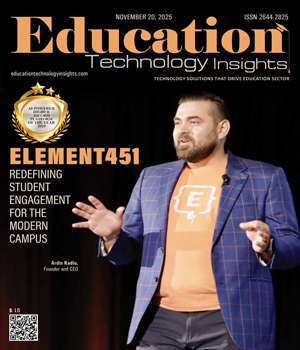THANK YOU FOR SUBSCRIBING
Be first to read the latest tech news, Industry Leader's Insights, and CIO interviews of medium and large enterprises exclusively from Education Technology Insights
Revolutionising Marketing Education for the Digital Age: Strategies for Success
Harrison Theodore Anderson, Student Recruitment Manager, Swinburne University of Technology | Monday, January 08, 2024
Marketing education adapts to the digital era with strategies like lifelong learning, updated courses, hands-on experience, industry collaboration, and an emphasis on data analytics for student success.
Over the past decade, the field of marketing education has undergone a profound transformation, shaped by the pervasive influence of the internet, social media, and rapid technological advancements. This shift has led to a redefinition of conventional perceptions tied to marketing, advertising, and sales among today's students, who increasingly view marketing through the lenses of social media and influencer strategies.
Adapting to the Age of Web 3.0 and Generative AI
As the landscape shifts into a new marketing era defined by Web 3.0 and Generative AI, a critical inquiry emerges: are current marketing education programs effectively preparing students for this dynamic landscape? The challenge resides in aligning education with the demands of 21st-century marketing, all while ensuring a solid foundation in the knowledge derived from 20th-century practices.
Strategies for Educators to Stay Ahead
Educators must be at the forefront of change, staying updated on marketing trends through continuous learning. This involves participating in conferences, enrolling in professional development courses, acquiring certifications, and building industry connections. Committing to lifelong learning ensures educators are well-equipped to guide students through the ever-evolving marketing landscape.
Curriculum Evolution: Aligning with Contemporary Trends
To meet the evolving demands of the marketing landscape, educators should proactively introduce new courses and update existing programs. The curriculum should reflect the current industry dynamics, encompassing areas like social media dynamics, influencer marketing, and the transformative impact of Web 3.0. By aligning coursework with contemporary marketing trends, educators ensure that students graduate with relevant and up-to-date skills.
Hands-On Learning: Bridging Theory and Practice
Recognizing marketing as inherently hands-on, educators must emphasize practical experience. Integrating experiential and project-based learning, facilitating internships, and encouraging participation in marketing contests become vital to equipping students with real-world skills. The ability to apply theoretical knowledge to practical scenarios enhances the students' readiness for the challenges they will face in the professional marketing arena.
Industry Integration: Bridging the Gap
Bringing industry professionals into the educational sphere creates a crucial bridge between academic theories and real-world marketing challenges. Collaborative efforts with experts allow students to gain insights into the industry's real-time innovations and hurdles. Guest lectures, workshops, and mentorship programs facilitate a seamless connection between the academic curriculum and the practical aspects of marketing.
Data Analytics Emphasis: Navigating the Analytical Landscape
In an era where data analytics plays a pivotal role in marketing decisions, educators should integrate relevant courses into their programs. Highlighting the significance of data analytics in the classroom and providing practical exposure to marketing data are critical steps. The ability to analyze and interpret data equips students with a valuable skill set sought after in contemporary marketing roles.
Adaptation Imperative: Responding to Change
Adaptation becomes imperative in a rapidly changing marketing landscape. The curriculum must mirror ongoing industry changes, seamlessly integrating technology into marketing education. Fostering a culture of lifelong learning among students and educators ensures a dynamic response to the evolving demands of the marketing terrain.
Future-Ready Graduates: Navigating the Dynamic Landscape
By regularly updating the curriculum to reflect the latest advancements, educators prepare students to confidently navigate the ever-changing marketing landscape. As marketing education transforms, educators must embrace change and create an environment that imparts foundational knowledge while fostering agility in students to thrive in the ever-evolving marketing world.
Strategic Integration for Success
The strategic integration of these educational strategies ensures that the next generation of marketers emerges well-prepared for the challenges and opportunities of the dynamic digital era. In a world where adaptability and innovation are paramount, marketing education stands at the forefront of cultivating the skills necessary for success in the evolving landscape.
Read Also
The Power of International Education Collaborations
Designing Schools around Student Voice
What is Edtech Leadership in 2026
Designing Academic Leadership Around Real Lives
Why Student Success Begins with Being Seen
Inclusion is not a Department: The Systemic Ripple Effect of Belonging

I agree We use cookies on this website to enhance your user experience. By clicking any link on this page you are giving your consent for us to set cookies. More info























